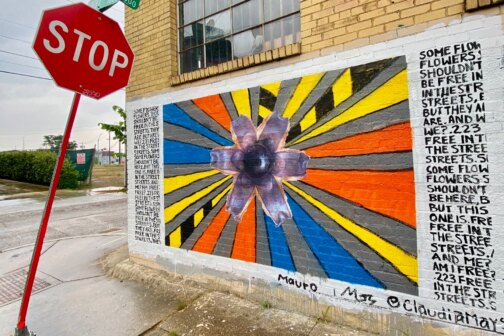In our October issue, we published a story about the first apartment complex in North Texas to use dog DNA to identify residents who don’t clean up after their pets. On the cover, we teased the story with this headline: “Dog Nazis: They Will Bust Your Pooch.” That cover tease occasioned a letter from executives at the Holocaust Museum. Following that, comes a response from Wick. Let’s tread gently in the comments, but I’d be interested to hear what you think about this.
We are writing to express our deep shock and disappointment at the cover of the October issue — which includes a D Magazine-sponsored full-page advertisement about the annual Hope for Humanity Dinner of the Dallas Holocaust Museum/Center for Education and Tolerance at which we celebrate and honor our local Holocaust survivors and local humanitarians. On the cover, in reference to a story about dog excrement, readers — including our local Holocaust survivors, the Jewish community, and event sponsors — are assaulted by the headline: “Dog Nazis: They Will Bust Your Pooch.”
This is a tasteless, insensitive, and historically inaccurate use of the word “Nazi” and is not only deeply offensive to Jews but also to all persons who believe it is wrong to make inappropriate comparisons to the Holocaust and to use terminology such as “Nazi” to trivialize aspects of popular culture. The casual use of the word “Nazi” diminishes, dishonors, and demeans Holocaust survivors and the millions who perished at the hands of the murderous Nazi regime, including American, British, Russian, and French soldiers and those civilians in the Underground who died defeating Nazi Germany, as well as the families and descendants of these groups.
The frivolous use of the word “Nazi” to bash any individual or organization in public discourse — in this case a story about dog poop — is simply wrong, and D Magazine should publicly apologize for its offensive, inappropriate, and historically inaccurate use of the word. Further, the article this headline refers to is crafted in extremely poor taste, including its analogies to Nazi behaviors and methodology. It is shameful to think anyone at D Magazine or elsewhere would find it humorous to compare the policing of irresponsible pet owners to that of the manhunt that nearly eliminated an entire culture.
What this deeply offensive headline underscores most is the need for the Dallas Holocaust Museum/Center for Education and Tolerance, whose mission is dedicated to preserving the memory of the Holocaust and to teaching the moral and ethical response to prejudice, hatred, and indifference, for the benefit of all humanity. Further, our community and its leadership will benefit more from an enlightened citizenship who discuss events of the past openly, with compassion and sensitivity. What our community does not need are behaviors or actions that encourage hate or indifference or diminish the events of the past to anecdotal history.
Should D Magazine choose to use the word “Nazi” in the future, we ask that the magazine not undermine, trivialize, or disrespect the history and memory of the Holocaust, the survivors of the Holocaust, those who liberated them, and those who were murdered by the Nazis.
Hylton Jonas, board chairman
Alice Murray, president and CEO
Maria MacMullin, senior director advancement
Response from Wick Allison, editor in chief:
Thank you for your note. I have to say that, in general, I agree with you. The overuse of the word “Nazi” does show a deterioration of language, so much so that there is even a predictive rule, Godwin’s Law, that at some point in any internet discussion someone will make an analogy to Hitler or Nazism.
On the other hand, these casual uses in the popular culture, such as on the internet, magazine covers, and TV shows, are never meant as compliments, which is good news. Jerry Seinfeld didn’t use the label “soup Nazi” to mean the restaurant owner was a nice guy. And the faux-Broadway play Springtime for Hitler in The Producers was intended to be a flop. It became a mega-hit only because it was so outrageously outré.
I think that’s an important point, because in fact there are — disturbingly — people who are proud to display a swastika, don themselves in Nazi paraphernalia, and call themselves neo-Nazis in our country right now. There are undoubtedly such people in Dallas. One might argue that the casual use of the term in popular culture only gives these people encouragement by lessening its impact. But I don’t think that’s true. To my mind, the always-negative association of the word actually keeps alive the opprobrium that it deserves.
My role as an editor makes me, I suppose, a certified member of the Language Police. You might think I should turn in my badge. But after Seinfeld and Mel Brooks and many others, I may have just fallen to the other end of the spectrum of sensitivity from you on the use of the term. Thank you for sharing your thoughts.





